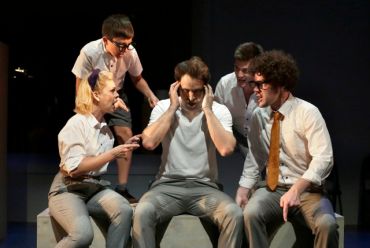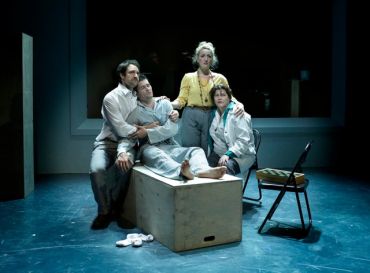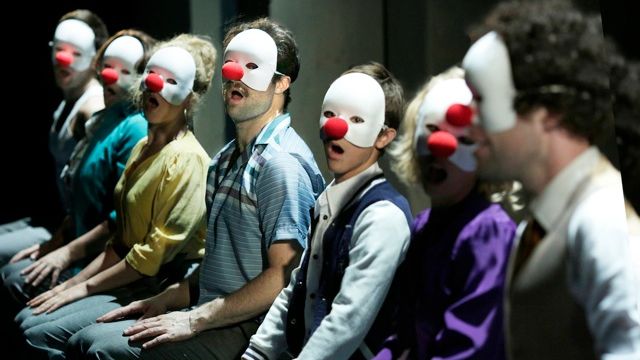Falsettos
Regular bursts of laughter made it clear that the stream of broad comedy in Act 1 of Stephen Colyer’s constantly busy, tightly choreographed production of Falsettos was landing well with the opening night audience, though the emphasis on vaudeville and shtick had me craving some less frenetically inventive moments of interpretation.
Still, I was reminded by the laughter that theatregoing certainly is ‘different strokes for different folks’.
Compensation for me came in the form of the unplugged, purely acoustic performance of this through-sung musical, supported only by brilliant piano accompaniment only. What an all-too-rare musical theatre joy to hear the natural, unamplified voices of favourite performers like Katrina Retallick and Margi de Ferranti.
Originally two separate short musicals (the last two parts of a trilogy), March of the Falsettos (1981) and Falsettoland (1990) were written a decade apart, though their action is separated by just two years. They were combined in their current form on Broadway in 1992.
In the first half, Jewish New Yorker Marvin (Tamlyn Henderson) has left his wife, Trina (Katrina Retallick), for a gay lover, Whizzer (Ben Hall). Trina marries Marvin’s psychiatrist (Stephen Anderson) and their 10-year-old son Jason (Anthony Garcia, who shares the role with Isaac Shaw) ends up one confused kid, as Marvin attempts to reinvent his family to nobody’s satisfaction.
 From an opening number in plastic party Groucho masks, director Colyer serves up a stylized interpretation (is it Brechtian with vaudeville inspired alienation techniques?), which his cast executed with absolute precision. All this was emotionally distancing, and whenever empathy entered the equation momentarily, it was promptly undercut. Costuming emphasized this, with all performers (including a blow-up dummy) wearing a kind of uniform, distinguished by minimal accessories, while the five boxes and five fold-up chairs (seven in Act 2) ensured fluidity in the numerous changes of settings.
From an opening number in plastic party Groucho masks, director Colyer serves up a stylized interpretation (is it Brechtian with vaudeville inspired alienation techniques?), which his cast executed with absolute precision. All this was emotionally distancing, and whenever empathy entered the equation momentarily, it was promptly undercut. Costuming emphasized this, with all performers (including a blow-up dummy) wearing a kind of uniform, distinguished by minimal accessories, while the five boxes and five fold-up chairs (seven in Act 2) ensured fluidity in the numerous changes of settings.
Played on this single level, the comic highs of the script as written scarcely peaked above the general hilarity, while conversely, even one of Katrina Retallick’s best songs, which she nails splendidly, is delivered with the comic twist of a deep frying basket on her head.
There were moments, though, where the busy vision seemed perfect, particularly Retallick’s serio-comic gym workout version of ‘I’m Breaking Down’. Was balancing truth in characterization with the complex physical choices the director’s intent? If so Retallick is the absolute standout.
The playfulness of Act One probably suits a young kid even better than adults, and Anthony Garcia seized and relished every moment of it as Jason.
Is it partly that Trina is a mre sympathetically written role? Often the male adult characters feel a bit shallow, narcissistic and self-centred by comparison. Is their shallowness in the script? Is it amplified by the production choices? Stephen Anderson’s psychiatrist Mendel is easily the more sympathetic portrayal of the trio.
 The choices become more textured and varied in Act 2 as AIDS comes into the picture. There seems to be more heart. Non-stop knockabout just wouldn’t match the theme, so here the comedy becomes mostly of the relief variety as events takes a more serious turn, though the production retains a dramatic unity by adopting similar framing to begin and end the act.
The choices become more textured and varied in Act 2 as AIDS comes into the picture. There seems to be more heart. Non-stop knockabout just wouldn’t match the theme, so here the comedy becomes mostly of the relief variety as events takes a more serious turn, though the production retains a dramatic unity by adopting similar framing to begin and end the act.
Margi de Ferrantiand Elise McCann complete the cast delightfully as Marvin's lesbian neighbours Dr Charlotte and caterer Cordelia (providing the nouvelle Kosher for Jason’s Bar Mitzvah in Whizzer’s hospital room). The second act is played far more naturalistically, with the shtick pulled right back, though this doesn’t mean there’s not room for comedy, like the delicious ensemble baseball song or Elise McCann’s warm, ditzy characterization of the caterer. Costuming becomes more conventional too, to match this shift in interpretation.
Humanity and warmth kick in, a transition the whole cast handles effectively, lifting the odds several notches.
The pre-AIDS innocence, sexual liberation and crazy family dysfunction of March of the Falsettos invites the lighter touch from which Stephen Colyer’s interpretation springs, while Falsettoland reflects a world changed forever. If I felt this version shot a little too hard for the comic, and was somewhat over-choreographed, when many of the audience rose in standing ovation on opening night, it also seemed I was on a hung jury.
Neil Litchfield
Photographer: Helen White
Subscribe to our E-Newsletter, buy our latest print edition or find a Performing Arts book at Book Nook.

